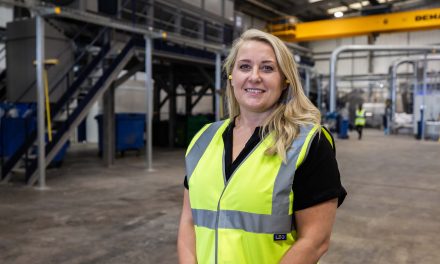 In these environmentally conscious times, everyone has obligations towards recycling and waste management, whether it be in homes businesses or factories. Conor Sugrue, general manager at MGB Plastics, explains how recycling should be a collective effort and must begin on the factory floor
In these environmentally conscious times, everyone has obligations towards recycling and waste management, whether it be in homes businesses or factories. Conor Sugrue, general manager at MGB Plastics, explains how recycling should be a collective effort and must begin on the factory floor
Recycling and waste management is now a part of everyday life, but for the UK to meet its targets for recycling, then it’s important that every aspect of society is involved.
Local authorities are constantly reminding homeowners that they must be responsible and recycle. However, waste management is a win-win for everyone who takes it seriously. Businesses must look at recycling from another angle by trying to change their production techniques to minimise waste and ensure sustainability of their products and their resources throughout their various processes.
Everyone in industry is becoming ‘greener’ by getting more and more involved in the recycling process. Companies are looking to reduce production, save energy and outsource more sustainable materials in an effort to do their part. All of these green products are showing consumers that they are more environmentally friendly, empowering everyone else to do their part as well.
Companies are becoming increasingly more strict on procurement criteria and are trying to do everything they can to help people go green. For example, many businesses and procurement directors are now stipulating in the tenders and contracts that products supplied to them must contain a specific percentage of recycled products inside. This goes for paper, plastic and other packaging methods and even other basic products that people use on a regular basis. The more recycled content a company uses, the more environmentally friendly they are and the better accolades they receive from the community.
 Helping business
Helping business
However, the accolades are not only helping the environment – it’s helping business too. Those that are producing more green products have better consumer and supplier relationships.
Just recycling isn’t enough though. The recycling needs to start at the ground level and that goes back to where everyone is getting the product to begin with – the manufacturers.
The more recycled plastic and paper going into the manufacturing process is better for everyone. It helps improve the economic status of everyone because the recycled plastics are more affordable. It also helps the waste management industry because they do not have to pay landfill taxes since the loads are getting smaller and smaller.
Recycled content also puts less strain on the landfills and also prevents everyone from exhausting natural resources that are in smaller and smaller demand. The ultimate goal is to keep rubbish away from the landfill because there isn’t much room left. The need for recycled material and biodegradable products are more important than ever before.
If the new materials the manufacturers produce don’t use recycled materials, then the materials come from all of our natural resources – which costs more money because of the farming, mining and other industries involved with producing it. It increases the carbon footprint and puts a strain on the landfills.
Embracing recycled products
Defra and the Department for Business (BIS) recently released a report talking about how UK companies need to do more to contain the growing waste issues and explore recycling opportunities more effectively.
 It is therefore vital that manufacturers stop pulling from the natural resources and start using recycled content more effectively. It helps every aspect of business and the environment, not to mention the energy that will be saved. Consumers want more recycled material, companies want to save money and the environment needs to hold on to its natural resources for as long as possible.
It is therefore vital that manufacturers stop pulling from the natural resources and start using recycled content more effectively. It helps every aspect of business and the environment, not to mention the energy that will be saved. Consumers want more recycled material, companies want to save money and the environment needs to hold on to its natural resources for as long as possible.
More and more contracts are being won around the UK to produce new recycled products. It is also easier to use the old products in the new product in order to use recycled content. For example, wheeled bins can be created using recycled old bins. The re-allocation of materials makes it more cost effective and environmentally friendly.
Summary
There are a variety of projects out there to help improve recycling rates. However, many companies are averaging about 30-40% participation rate for recycling – in order for the UK to do their part sufficiently, that number needs to increase to around 70%.
The UK is starting to make headway towards sustainability, but more companies need to focus on recycled materials and effective waste management. The only way the UK will be able to succeed is to get the entire supply chain involved in the process. This way it involves the manufacturer, the suppliers, and the households.







